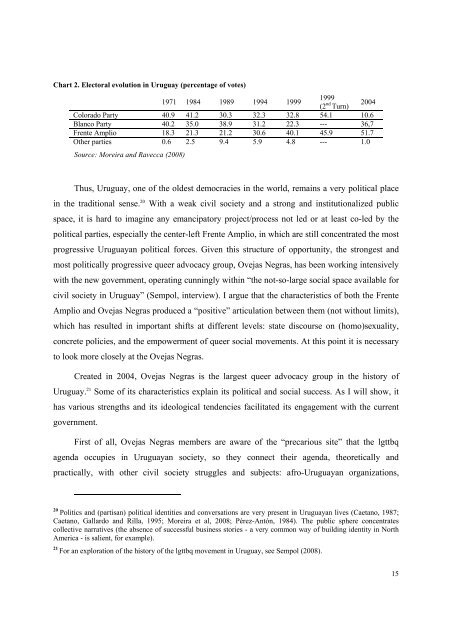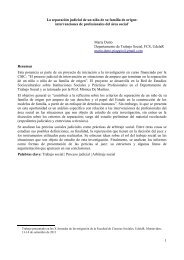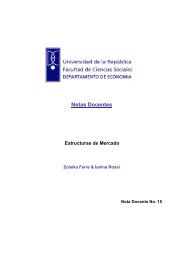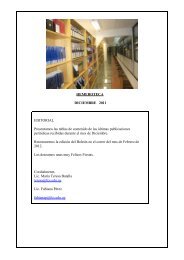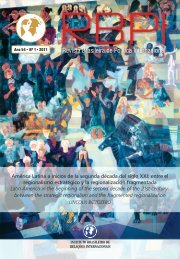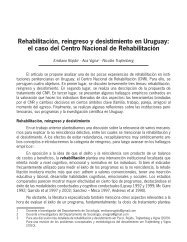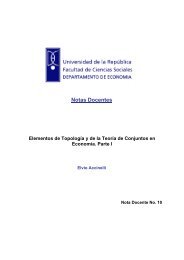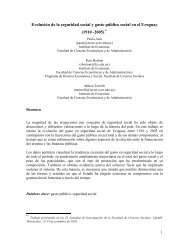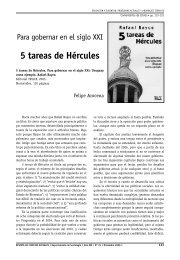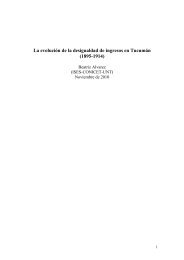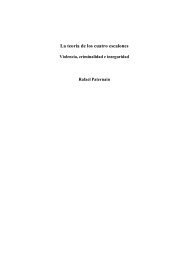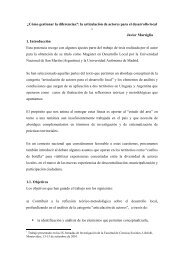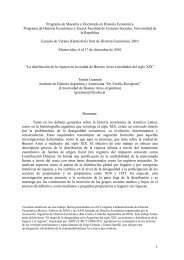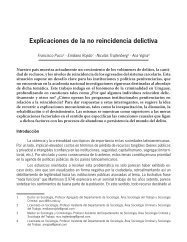Paulo Ravecca - Facultad de Ciencias Sociales
Paulo Ravecca - Facultad de Ciencias Sociales
Paulo Ravecca - Facultad de Ciencias Sociales
You also want an ePaper? Increase the reach of your titles
YUMPU automatically turns print PDFs into web optimized ePapers that Google loves.
Chart 2. Electoral evolution in Uruguay (percentage of votes)<br />
1971 1984 1989 1994 1999<br />
1999<br />
(2 nd Turn)<br />
2004<br />
Colorado Party 40.9 41.2 30.3 32.3 32.8 54.1 10.6<br />
Blanco Party 40.2 35.0 38.9 31.2 22.3 --- 36,7<br />
Frente Amplio 18.3 21.3 21.2 30.6 40.1 45.9 51.7<br />
Other parties 0.6 2.5 9.4 5.9 4.8 --- 1.0<br />
Source: Moreira and <strong>Ravecca</strong> (2008)<br />
Thus, Uruguay, one of the ol<strong>de</strong>st <strong>de</strong>mocracies in the world, remains a very political place<br />
in the traditional sense. 20 With a weak civil society and a strong and institutionalized public<br />
space, it is hard to imagine any emancipatory project/process not led or at least co-led by the<br />
political parties, especially the center-left Frente Amplio, in which are still concentrated the most<br />
progressive Uruguayan political forces. Given this structure of opportunity, the strongest and<br />
most politically progressive queer advocacy group, Ovejas Negras, has been working intensively<br />
with the new government, operating cunningly within “the not-so-large social space available for<br />
civil society in Uruguay” (Sempol, interview). I argue that the characteristics of both the Frente<br />
Amplio and Ovejas Negras produced a “positive” articulation between them (not without limits),<br />
which has resulted in important shifts at different levels: state discourse on (homo)sexuality,<br />
concrete policies, and the empowerment of queer social movements. At this point it is necessary<br />
to look more closely at the Ovejas Negras.<br />
Created in 2004, Ovejas Negras is the largest queer advocacy group in the history of<br />
Uruguay. 21 Some of its characteristics explain its political and social success. As I will show, it<br />
has various strengths and its i<strong>de</strong>ological ten<strong>de</strong>ncies facilitated its engagement with the current<br />
government.<br />
First of all, Ovejas Negras members are aware of the “precarious site” that the lgttbq<br />
agenda occupies in Uruguayan society, so they connect their agenda, theoretically and<br />
practically, with other civil society struggles and subjects: afro-Uruguayan organizations,<br />
20 Politics and (partisan) political i<strong>de</strong>ntities and conversations are very present in Uruguayan lives (Caetano, 1987;<br />
Caetano, Gallardo and Rilla, 1995; Moreira et al, 2008; Pérez-Antón, 1984). The public sphere concentrates<br />
collective narratives (the absence of successful business stories - a very common way of building i<strong>de</strong>ntity in North<br />
America - is salient, for example).<br />
21 For an exploration of the history of the lgttbq movement in Uruguay, see Sempol (2008).<br />
15


